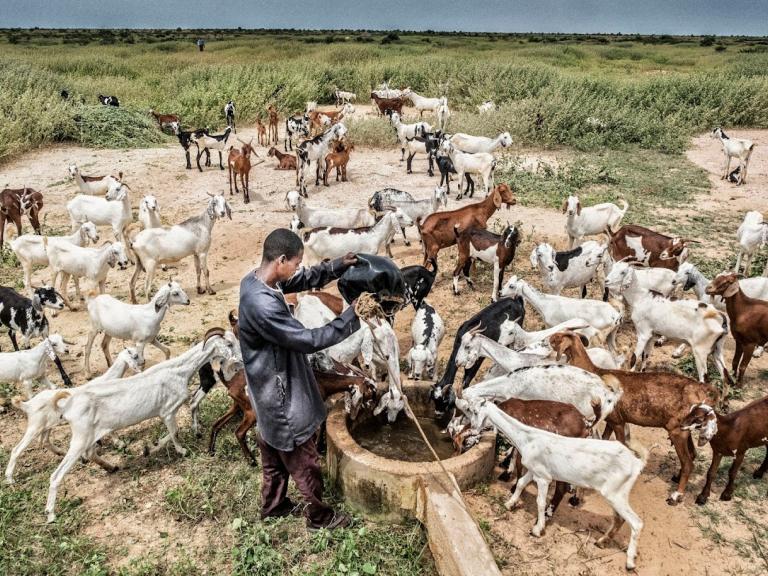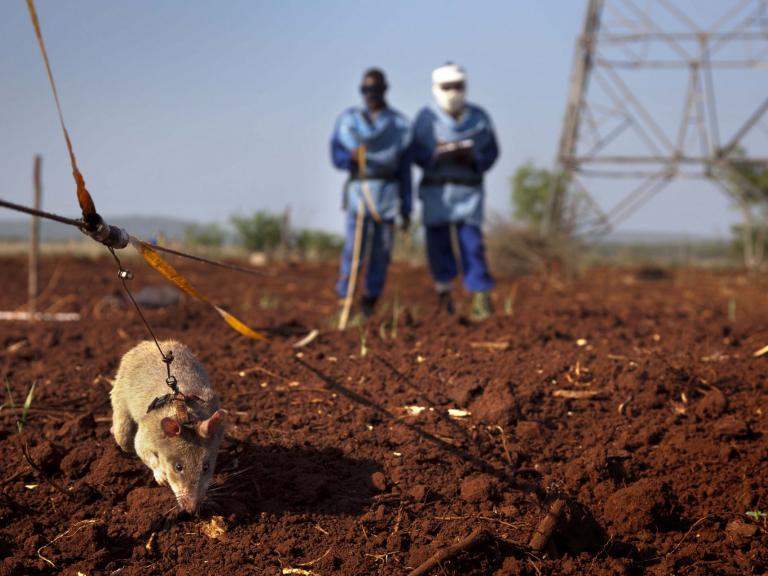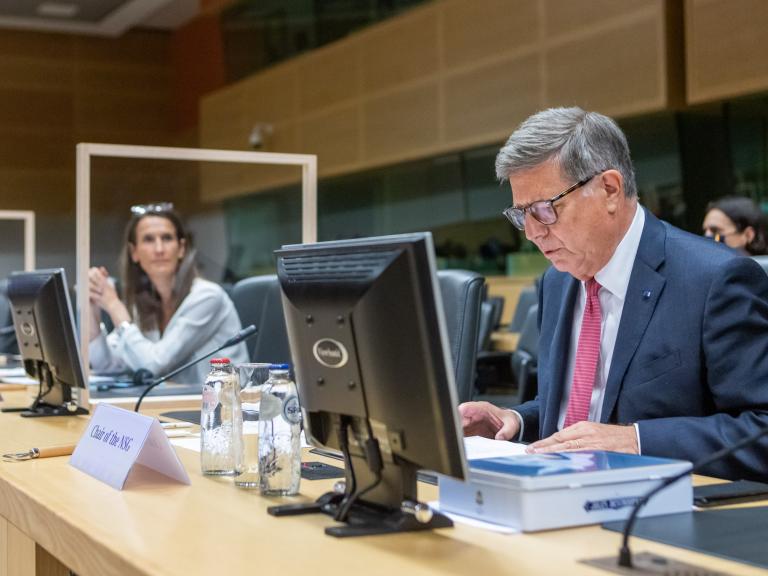-
Last updated on

Economic prosperity, and therefore international trade, is vital for our security. Photo: Port of Antwerp. © Shutterstock
For the first time, Belgium has developed a detailed ‘National Security Strategy’ (NSS). And it was much needed. People and countries are more and more interconnected, which brings with it a whole range of new, complex threats.
Our FPS played a central role in the creation of the strategy. After all, our ‘national’ security is not limited to the interior. Many, if not all, ‘vital interests’ are strongly influenced by what goes on outside our borders. And that international environment is becoming less and less stable.
Not only are ‘internal’ and ‘external’ strongly intertwined, we also need partnerships – often in an EU context – to adequately respond to the threats. Foreign policy is thus becoming a fundamental dimension of national security.
The NSS offers a long-term vision of 10 to 15 years, which will be updated periodically. A careful review will take place at the beginning of each new legislature.
We provide a detailed overview of the NSS below.
In brief
The NSS formulates a broad set of coherent measures to ensure the security of our country in an unstable world. In the event of incidents or large-scale crises, it must enable our country to continue to function.
The threats are legion: cyber attacks, rising tensions between superpowers, fake news, extreme ideologies, climate disruption, new diseases, unfair economic competition, etc.
In response to that, our country will: protect democracy and the rule of law, increase its commitment to economic security, strengthen its resilience and be internationally active.
Crucial to this is a whole of government approach: security is an indivisible core task of all authorities. But national self-sufficiency by itself is not enough. Internal security is impossible without an active foreign, development and defence policy. Diplomacy is therefore an essential component of the national security policy.
6 vital interests
The NSS argues that our national security is compromised when one or more of 6 vital interests are threatened.
For example, our country relies heavily on a well-functioning international system of reliable and enforceable agreements and efficient multilateral (or international) organisations.
A well-oiled European Union is also essential for our country, not only for our economy but also for many other areas, including our security.
The democratic rule of law is also a crucial element of our security. This includes government ensuring social and political stability and guaranteeing democratic freedoms. Outside influences may undermine that rule of law.
The physical safety of citizens – including Belgians abroad – and the integrity of our national territory must also be protected. That aspect is deeply intertwined with the EU and NATO.
Without our natural environment, we cannot survive. However, it is highly threatened by the loss of biodiversity, pollution and a disrupted climate. Once again, an element that is not unrelated to what is happening abroad.
Finally, our economic prosperity is also of vital importance. And a highly open economy like ours rests upon a strong nationally and internationally regulated framework for trade and investment, in which social and environmental standards are also crucial.

For the physical security of its citizens and the integrity of our national territory, NATO is a crucial alliance. Photo: Belgian soldiers taking part in a NATO exercise in Lithuania. © NATO
Threats
The NSS identifies a range of threats that undermine the 6 vital interests. The tensions between the superpowers are rising. Russia is pushing at the gates of Ukraine, while the US and China are embroiled in an economic power struggle, to name a few examples. Amidst all this, Belgium and the EU must hold their own.
‘Non-state actors’ are also being given freer rein. These include extremists, terror groups and organised crime. Both states and non-state actors are increasingly using ‘hybrid methods’ that test the boundaries between war and peace. This is where subtle methods are employed to undermine the stability of a society: disseminating disinformation, spying, blackmail, sabotage, etc. But they may also use chemical, biological, radiological and nuclear agents, whether or not combined with explosives (known as CBRNe).
‘Cybercrime’ is another growing threat. Enemy entities may sabotage digital infrastructure through vulnerabilities. This could have far-reaching implications for our economy and security. Space-based technologies that control our communications and geo-positioning (GPS) are only one example. A country like Belgium is especially vulnerable to this, since the EU and NATO have their headquarters here.
In an open economy like Belgium, international collaboration is indispensable for companies and universities. But one must not lose sight of the fact that such collaboration can give rise to the dishonest purloining of knowledge or interference in crucial national decision-making processes. The dependence on raw materials is another risk factor.
Free speech is a fundamental part of the democratic rule of law. The condition is that it does not incite hatred and violence. Nonetheless, more and more extreme ideologies are lurking, which could degenerate into Islamic extremism as well as right-wing and left-wing extremism, plus terrorism. Fake news and disinformation sow confusion, polarise society and erode trust in government.
Climate change and loss of biodiversity could also greatly disrupt our society. After all, they disrupt not only food production, but also labour productivity, international trade and so on. But the transition to a climate-neutral society also involves risks. After all, it will be accompanied by profound changes in the way we travel, live, produce, heat, etc.
As we experienced with COVID-19, a highly connected world – with a lot of travel, closer contacts between humans and animals, etc. – offers more opportunity for new diseases. Antibiotic resistance and the invasion of foreign organisms are also threats to health.
Finally, Belgium relies heavily on an international order based on rules. Inside the EU, NATO, the UN and the Organization for Security and Cooperation in Europe (OSCE). More and more voices, however, are turning their backs on that international order or trying to undermine it, even within the EU.

The protection of our natural environment is also essential for our safety. Photo: The High Fens. © Shutterstock
Policy orientations
To counteract all these threats, the NSS proposes 4 clusters of ‘policy orientations’, all of which are highly interrelated.
Protecting democracy and the rule of law
Belgium aims to nurture democratic values and combat polarisation. In doing so, it mirrors the European Commission's ‘Action Plan for European Democracy’. Citizens must be more involved, disinformation combated, media freedom and pluralism strengthened, and so on.
Our country also aims to ensure human rights and equality in society in order to counteract polarisation. It will continue to promote democratic values internationally.
There is great consideration for a multidisciplinary approach to extremism and terrorism, based on early detection, a local approach, information sharing and criminal prosecution, among other things. Prevention is crucial. Education, welfare, easy access to the labour market, and proper civic integration and inclusion are all domains that can prevent breeding grounds for extremism from developing.
This national approach will chime significantly with European and international efforts in that area. Belgium will also contribute loyally to the international battle against terrorism, wherever it is in the world, following on from its current efforts in Iraq and the Sahel. Strong coordination between the Departments of Foreign Affairs and Defence is essential in this regard.
Increased commitment to economic security
Belgium is committed to a free, secure and fair international environment for its trade. This includes making stronger enforceable commitments around sustainable development, including environmental, climate and social standards. Within the EU, our country is helping to develop measures to better protect our economic players and authorities. The EU will also strengthen its resilience to financial and monetary crises, including through a banking union.
Just like the EU, our country is striving for greater autonomy. To this end, it will identify strategic sectors such as high-tech, energy, food and healthcare. The diversification of production and supply chains may offer a way out, as may stockpiling.
Supporting scientific research and industrial-technological development is crucial to wealth creation in our country. International collaboration provides oxygen for that innovation, as long as there is sound legislation for protecting intellectual property. Belgium also aims to raise its international profile in the blue (maritime) economy.

At international level, Belgium is doing everything it can to punch above its weight. Photo: Belgium presided over the UN Security Council in February 2020. (© UN Photo/Loey Felipe
Strengthening resilience
Belgium must become more resilient in many areas. For example, our country must be able to continue to guarantee vital services in the event of a failure, incident or attack: transport, energy, finance, electronic communications, drinking water, public health, digital infrastructure, etc. Operators of such critical infrastructures must therefore draw up a security plan to that end.
Not only must Belgium take urgent steps to combat climate change, it must also adapt to climate changes that are inevitable. The transition to a climate-neutral society by 2050 will require profound changes. Belgium will also contribute to the global response to climate change by supporting poorer countries.
Public health needs adequate supplies of protective equipment and medication, as well as close monitoring for any new conditions. The COVID-19 crisis has taught us some important lessons in this regard.
Within the World Health Organization, Belgium has signed up to a One Health approach that brings together human health, animal health, agriculture and the environment. It is also pushing for a global pandemic treaty that will better arm us against health crises. The Belgian Development Cooperation is investing heavily in the health systems of partner countries.
The Cyber-security Strategy Belgium 2.0 has already given Belgium a plan for better protecting its information and communication systems. The coordination is in the hands of the Centre for Cybersecurity Belgium (CCB).
New technologies such as 5G, artificial intelligence and space technologies should not be misused for espionage, interference or sabotage. This is why Belgium is actively participating in consultations on new European legislation in these domains.
Since 2019, the CBRNe Centre of Excellence has been guarding against the potential risks from CBRNe. Internationally, our country is extremely active in countering the proliferation of weapons, including nuclear ones, and in restoring the fabric of arms control and disarmament treaties.

The Belgian Development Cooperation contributes to stability and security beyond our borders, and thus to our national security. Photo: water tower in Sahel country Niger, built by Enabel. © Enabel/Tim Dirven
International responsibility
There are currently around 500,000 Belgians living abroad, while many also travel. Belgium therefore bears a great responsibility to protect its citizens far beyond its borders. As the evacuation from Afghanistan demonstrated, this requires close collaboration between all security departments involved, such as Home Affairs, Defence, Foreign Affairs, Justice, and Asylum and Migration.
Our country relies heavily on the EU and NATO for an enhanced approach to conventional and hybrid state threats. Collective defence in which Belgium takes responsibility is once again central. The EU Strategy for a Security Union provides guidance for an integrated approach to hybrid threats. Domestically, a ‘hybrid threats’ platform was established and a mechanism for the timely detection of disinformation is being developed. As a host country of the EU and NATO, there is great consideration for resilience against espionage.
Belgium remains fully committed to a decisive EU, which is all in all the best instrument for defending its interests on a global scale. The Belgian presidency of the Council of the EU in 2024 will provide further opportunities to do so.
No domestic security without consideration for foreign stability. Our diplomacy is thus an intrinsic part of the national security policy. As natural bridge-builders, our diplomats will continue to strive to actively engage all countries, including the superpowers, in multilateral collaboration to address shared challenges.
Belgium will actively seek to get more Belgians into top positions in the priority organisations (EU, UN, NATO and OSCE). In addition, our country will lobby to attract more seats for international organisations in Brussels. The Belgian Development Cooperation is also part of a coherent Belgian foreign policy, because it contributes to stability and security beyond our borders. Finally, all of our diplomatic representations are indispensable antennae for spotting and identifying trends and potential risks in a timely manner.
Discover the complete strategy: Dutch and French.
The NSS was created in a working group within the Coordination Committee on Intelligence and Security (CCIV). The working group, chaired by the FPS Foreign Affairs, also included the National Crisis Centre, Defence, the General Intelligence and Security Service, the FPS Justice, the Board of Public Prosecutors, the Federal Police, the Coordination Unit for Threat Analysis (CUTA) and State Security.
The Egmont Institute organised consultations with the private sector, civil society and academia. Finally, the federal states were also consulted, in addition to federal departments responsible for the economy, public health, climate and environment, among others.
More on Peace & security

Belgium fully committed to efforts in the Sahel region
INTERVIEW - Belgium wants to become more involved in the Sahel, a region that is facing countless challenges. Bart De Groof, the...

Belgium steps into the breach to achieve a mine-free world
Belgium is making great efforts to eradicate the horror of anti-personnel mines. Nevertheless, a mine-free world is not somethin...

Strong commitment to peaceful uses of nuclear expertise
With a plenary session in the Egmont Palace (Brussels) in June 2021, Belgium successfully concluded its Presidency of the Nuclea...
